
ALGAE
Scope & Guideline
Advancing knowledge in aquatic ecosystems.
Introduction
Aims and Scopes
- Taxonomy and Phylogenetics:
Research focusing on the classification, identification, and evolutionary relationships of algal species, including novel species descriptions and phylogenetic analyses. - Physiology and Biochemistry:
Studies exploring the physiological responses of algae to environmental stressors, nutrient dynamics, and biochemical properties of algal compounds. - Ecology and Environmental Interactions:
Investigations into the ecological roles of algae in various habitats, including their interactions with other organisms and responses to climate change. - Biotechnology and Applications:
Research aimed at harnessing algal resources for various applications, including biofuels, pharmaceuticals, bioremediation, and aquaculture. - Molecular and Genetic Studies:
Utilization of molecular techniques to understand genetic diversity, gene expression, and metabolic pathways in algae.
Trending and Emerging
- Climate Change and Algal Responses:
Increasing research on how climate change affects algal physiology, distribution, and ecological interactions, highlighting the importance of understanding these impacts for conservation and management. - Bioprospecting for Bioactive Compounds:
A growing focus on the extraction and application of bioactive compounds from algae for health, nutrition, and industrial applications, driven by the demand for sustainable resources. - Metabarcoding and Molecular Techniques:
The adoption of advanced molecular techniques such as metabarcoding for biodiversity assessments is on the rise, enhancing the understanding of algal diversity and distribution. - Interdisciplinary Approaches in Algal Research:
There is a notable trend towards interdisciplinary studies that combine ecology, genetics, and biotechnology, reflecting the complex nature of algal systems and their applications. - Sustainable Aquaculture and Bioremediation:
An increasing emphasis on the role of algae in sustainable aquaculture practices and their potential for bioremediation, responding to global challenges in food security and environmental health.
Declining or Waning
- Traditional Aquaculture Practices:
Research on conventional aquaculture methods using algae has decreased, possibly due to a shift towards more sustainable and innovative practices that integrate ecological principles. - Static Environmental Assessments:
Studies that provide static assessments of algal populations without considering dynamic environmental changes are becoming less common as the field moves towards more integrative and adaptive management approaches. - Historical Taxonomic Studies:
There seems to be a waning interest in purely historical taxonomic research, as the focus shifts towards molecular approaches that provide deeper insights into phylogenetic relationships. - Single-Species Laboratory Studies:
Research focusing solely on single algal species in controlled laboratory settings is declining, with more emphasis now on multi-species interactions and field studies.
Similar Journals
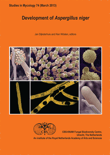
STUDIES IN MYCOLOGY
Exploring the Depths of Fungal DiversitySTUDIES IN MYCOLOGY is a premier journal dedicated to advancing research in the field of mycology, published by the renowned WESTERDIJK FUNGAL BIODIVERSITY INSTITUTE. With an impact factor that places it in the top quartile (Q1) of both Agricultural and Biological Sciences and Plant Science categories, it holds a prestigious position in the scientific community, ranking #1 out of 193 in its field as per Scopus metrics. Since its transition to Open Access in 2008, it has made significant strides in disseminating high-quality research widely, fostering a greater understanding of fungal biodiversity and its ecological impact. Covering a broad spectrum of topics related to mycology, the journal aims to provide researchers, professionals, and students with a platform for sharing innovative findings, stimulating academic discourse, and promoting collaborative efforts within this vital area of study. Hailing from the Netherlands, STUDIES IN MYCOLOGY serves as an invaluable resource for exploring the complexities of fungi, their interactions with various ecosystems, and their practical applications in agriculture and beyond.

JOURNAL OF BIOSCIENCES
Elevating Knowledge in Molecular Biology and GeneticsJOURNAL OF BIOSCIENCES, published by the Indian Academy of Sciences, has established itself as a pioneering platform in the fields of biosciences, encompassing diverse research areas such as agricultural and biological sciences, biochemistry, genetics, molecular biology, and medicine. With an impressive trajectory since its inception in 1979, the journal has achieved notable recognition, securing a Q1 ranking in Agricultural and Biological Sciences and maintaining its place in the top quartiles for Biochemistry and Medicine as of 2023. With Scopus rankings placing it at #32 in General Agricultural and Biological Sciences and #65 in General Biochemistry, Genetics, and Molecular Biology, the journal reaches the 85th and 70th percentiles respectively, reflecting its impact and relevance in current scientific discourse. Although it does not offer open access, the JOURNAL OF BIOSCIENCES remains crucial for researchers, professionals, and students dedicated to advancing knowledge and innovation within the biosciences, providing a vibrant forum for high-quality research and comprehensive reviews.

ACTA PROTOZOOLOGICA
Advancing Knowledge in Protozoology and EcologyACTA PROTOZOOLOGICA, published by Jagiellonian University, Institute of Environmental Sciences, is a premier journal dedicated to the study of protozoology, encompassing the biological complexities of protozoa and their ecological implications. With an ISSN of 0065-1583 and an E-ISSN of 1689-0027, this journal has been a vital resource for researchers and professionals in the fields of Agricultural and Biological Sciences since its inception in 1973, with coverage spanning from 1973 to 1990 and from 1992 to 2024. Recognized as a Q1 journal in its category for 2023, ACTA PROTOZOOLOGICA boasts high visibility and contributes significantly to the advance of knowledge and research in its discipline, as evidenced by its Scopus ranking of #103 out of 221 in Agricultural and Biological Sciences. While the journal is not open access, it maintains a rigorous selection process, ensuring that only the highest quality research is disseminated. Located at Gronostajowa 7, Krakow 30-387, Poland, the journal aims to foster communication among scientists and promote the study of protozoa in both academic and applied contexts, making it an essential source for anyone involved in biological sciences, ecology, and related research.

Fottea
Elevating algal science with rigorous peer-reviewed studies.Fottea is a prestigious journal, published by the Czech Phycological Society, dedicated to advancing the field of plant sciences with a specific focus on freshwater algal research. Established in 2008, this quarterly publication has steadily gained recognition, evidenced by its impressive Q2 ranking in Plant Science and a solid placement within the 68th percentile among its peers in Scopus rankings. Fottea serves as a vital platform for researchers, professionals, and students to disseminate and access cutting-edge studies, fostering collaboration and innovation within the aquatic ecosystem research community. Although currently operating under a traditional publishing model without open access options, it remains committed to providing high-quality, peer-reviewed content that is essential for the progression of phycology and related disciplines. With its base in the beautiful Czech Republic, the journal aims to bridge local and global research efforts, contributing to the broader understanding of algal biology and ecology.
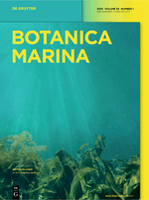
BOTANICA MARINA
Connecting researchers to the vital science of our oceans.BOTANICA MARINA, published by Walter de Gruyter GmbH, is a prestigious journal dedicated to the fields of aquatic science, ecology, and plant science, with an ISSN of 0006-8055 and an E-ISSN of 1437-4323. Since its inception in 1959, this journal has served as a vital platform for disseminating high-quality research, contributing significantly to the understanding of marine botany and ecosystems. Recognized for its impact, BOTANICA MARINA ranks in the Q2 quartile across multiple categories, reflecting its robust standing in the academic community. With its Scopus rankings placing it in the upper percentiles for Ecology, Evolution, Behavior and Systematics, as well as Aquatic Science and Plant Science, this journal is essential for researchers and professionals seeking to advance their understanding of marine environments. Although it currently does not offer Open Access options, access to its articles can lead to critical insights and developments in the study of marine biodiversity. The journal's commitment to quality and relevance makes it an invaluable resource for students and seasoned researchers alike.
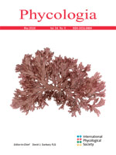
PHYCOLOGIA
Catalyzing Discoveries in Algal BiologyPHYCOLOGIA is a prestigious academic journal published by Taylor & Francis Ltd, specializing in the fields of Aquatic Science and Plant Science. With an ISSN of 0031-8884 and an E-ISSN of 2330-2968, the journal has established itself as an influential platform for disseminating high-quality research on algal biology and its ecological significance. Renowned for its rigorous peer-review process, PHYCOLOGIA is categorized in the Q2 quartile for both Aquatic Science and Plant Science as of 2023, reflecting its solid reputation and contribution to the respective fields, evidenced by Scopus ranks placing it in the top tiers of research outputs. The journal offers access to a wealth of knowledge, embracing studies that range from fundamental aspects of phycology to applied environmental sciences, making it a vital resource for researchers, professionals, and students who seek to advance their understanding of aquatic and plant ecosystems. With a focus on innovative methodologies and interdisciplinary approaches, PHYCOLOGIA invites submissions that push the boundaries of current knowledge and contribute to the global discourse on phytobiological sciences.
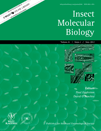
INSECT MOLECULAR BIOLOGY
Exploring the Genetic Blueprint of Insect LifeInsect Molecular Biology, published by Wiley, is a leading journal dedicated to advancing the field of insect biology through molecular perspectives. With a prominent ISSN of 0962-1075 and an E-ISSN of 1365-2583, this journal has gained a significant reputation since its inception in 1992, showcasing a diverse array of research that spans across genetics, molecular biology, and specific aspects of insect science. As of 2023, it has achieved a remarkable categorization, recognized as Q1 in Insect Science and Q3 in Genetics and Molecular Biology, underscoring its pivotal role in fostering academic discourse at the intersection of biology and technology. The journal is indexed in esteemed databases with strong rankings, sitting at the 82nd percentile in Insect Science, which highlights the impactful research it publishes. While it currently does not offer open access, Insect Molecular Biology remains an essential resource for researchers, students, and professionals eager to explore the complexities of insect life at the molecular level. By disseminating innovative findings and methodologies, the journal significantly contributes to both theoretical and applied entomological research, making it a cornerstone for anyone passionate about the intricate world of insects.
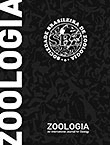
Zoologia
Exploring the Wonders of Animal LifeZoologia, published by the SOC BRASILEIRA ZOOLOGIA and UNIV FEDERAL PARANA, is a premier open-access journal dedicated to the field of zoology and related disciplines. Established in 2009 and based in Brazil, this journal has quickly positioned itself as a vital resource for researchers, professionals, and students, providing a platform for innovative research and comprehensive reviews in animal science and zoology. With an H-index indicative of its growing citation impact and a current Scopus ranking placing it in the 46th percentile of its category, Zoologia focuses on increasing the visibility and accessibility of cutting-edge zoological research. The journal aims to advance the understanding of animal biology, ecology, and conservation, making it an essential read for those invested in animal science. As an open-access publication, it ensures that knowledge dissemination is unrestricted, fostering a collaborative scientific community striving towards impactful conservation and biodiversity initiatives.

PERIODICUM BIOLOGORUM
Pioneering Discoveries in Biochemistry and GeneticsPERIODICUM BIOLOGORUM is a well-established interdisciplinary journal published in Croatia that focuses on advancing the fields of agricultural and biological sciences, biochemistry, genetics, and molecular biology, along with general medicine. With its roots dating back to 1980, the journal has been an essential platform for the dissemination of original research, reviews, and theoretical studies, fostering collaboration and dialogue among researchers within these diverse areas. While currently holding a Q4 quartile ranking in several categories, including agricultural and biological sciences, biochemistry, and general medicine, it provides a significant opportunity for authors seeking to contribute to the body of knowledge in these sectors. Although Open Access options are not available, the journal's rich history and commitment to quality scholarship make it a valuable resource for professionals, researchers, and students alike, aiming to stay informed about current trends and advancements in biological research and its applications.

FUNGAL DIVERSITY
Bridging Biodiversity and Conservation: Fungi at the ForefrontFungal Diversity is a premier academic journal dedicated to advancing the science of mycology, encompassing ecological, evolutionary, and biological research involving fungi. Published by Springer, this journal has established a significant presence in the academic community since its inception in 1998, and it continues to thrive with a convergence period extending to 2024. Holding a prestigious Q1 ranking in several categories — including Ecology, Ecology, Evolution, Behavior and Systematics, and Plant Science — Fungal Diversity showcases cutting-edge research that influences ecological management, conservation, and biodiversity studies. With its notable positions in Scopus rankings, including being ranked #1 in Environmental Science - Ecology, the journal serves as an essential resource for researchers, professionals, and students interested in the complex interplay between fungi and their environments. Although it does not currently offer open access, interested readers can benefit from the journal's rich repository of peer-reviewed articles, making Fungal Diversity a vital component of the scientific literature landscape.